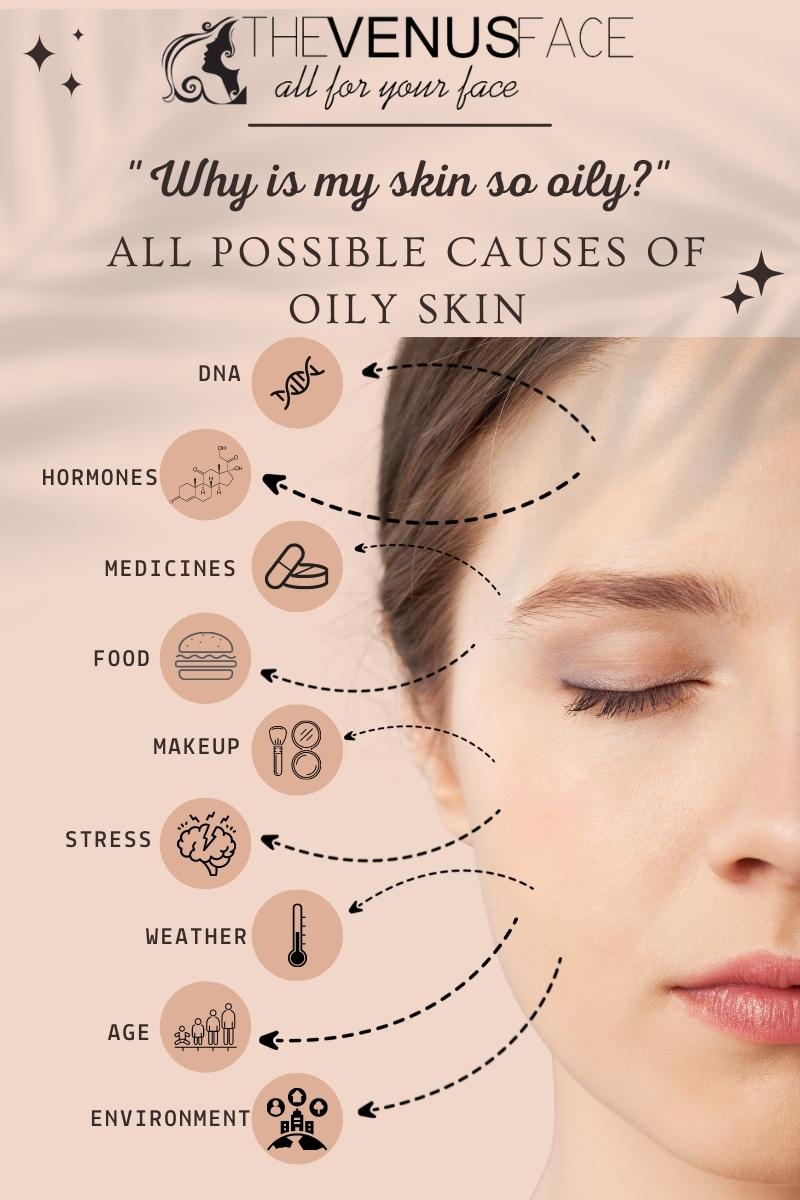Oily skin is a common condition affecting the oil glands in the skin. This causes an excess of sebum to be produced, which can lead to clogged pores and acne breakouts.
This problem can be caused by many different factors; however, the most common factor is genetics. Genetics are responsible for the overproduction of sebum in the oil glands in the skin.
However, there are other factors that can cause this skin condition too. This article will include all possible causes of oily skin.

What causes oily skin?
Hereditary factors
As said before, the reason why someone has oily skin is usually solely because of genetics. This means that this condition can be hereditary; in other words, it could be passed on from either parent to their children.
However, someone who has parents with greasy skin does not automatically mean they will have the same condition. Indeed, even if you come from a family where all members have oily skin, this doesn’t necessarily mean that your oil production will be at the same level as theirs’. Each person’s oil glands are different and everyone produces sebum according to their own hormonal levels.
On the other hand, sometimes people cannot determine whether or not they inherited an oily skin type because there haven’t been any previous generations in their family to compare themselves to.
More: Why Is My Oily Skin Suddenly Dry?
Hormones
Although it is very rare, hormones can also cause an excess of sebum production. This happens because there are certain times in the human cycle where women’s bodies produce more androgens than usual (androgen is a hormone mostly present in males, but it is also found in females). These times include puberty and menstruation. When our bodies go through these moments of hormonal changes, the production of sebum increases too, which can lead to oily skin among other things such as acne.
Besides this case, pregnancy has been known to make a person develop oily skin for 9 months too. This usually occurs during the 2nd trimester when estrogen levels tend to be higher in pregnant females. This rise in estrogen levels is thought to be the cause of oily skin among pregnant women.
More: Can Oily Skin Use Dry Skin Products?
Medication
Some medications, such as oral contraceptives (also known as the birth control pill) or anesthesia can lead to an excess of oil production too. Although it may sound counter-intuitive, this occurs because these drugs have been designed specifically to lower a person’s testosterone levels which usually tend to increase during puberty and menstruation, two periods where they are also at high risk for developing acne due to the high sebum production that inevitably results from high testosterone levels.
Although there have not been any studies linking medication use with oily skin specifically, it is commonly advised by dermatologists that people who take these contraception pills should avoid using mineral oils or products that contain mineral oils as they can lead to acne breakouts and worsen oily skin.
Eating foods that cause oily skin
Some foods that you eat can also cause oily skin. The most common example is when someone eats too many dairy products. In this case, The high content of hormones in dairy products can lead to oily skin. In addition, some studies have shown that a diet that includes too many high-glycemic-index foods and refined carbs and sugars can also worsen oily skin.
Using the wrong makeup and skincare products
There are several ingredients in makeup that are thought to be the main cause of oily skin when they are applied topically. Oil-based foundations and concealers are these examples. This is because these foundation types contain oil-based emollients that can block pores easily when applied to the face, allowing excess sebum to clog pores more easily. Water-based makeup tends to not have this effect since it doesn’t contain any oils.
Also, make sure to use skincare products that are designed for oily skin and that do not contain comedogenic ingredients (ingredients known to clog pores and cause acne).
More: Can I Skip Moisturizer and Use Sunscreen for Oily Skin?
Stress
Studies have shown that stress can also worsen oily skin. This happens because, when a person is stressed out, their body releases cortisol which activates the sebaceous glands. As these glands are activated, they produce more oil than usual which results in oily skin.
More: Why Is My Skin So Oily When I Wake Up?
Excessively hot weather
Finally, even though you shouldn’t be too concerned about it since it’s only temporary, sometimes people notice their skin becomes very oily during the summer months or on extremely hot days. Even so, this should not be too serious of an issue as long as the person regularly uses sunscreen to protect their face from UV rays and any other environmental factors that could cause sun damage.
More: Do Sunbeds Help Oily Skin?
Your age
As a person gets older, their skin tends to become less oily. This is because, as we grow older, the sebaceous glands produce sebum more slowly and at a lesser rate than when we were young.
Age has also been shown to be related to how oily people’s skin is in general, which makes sense given these facts about sebum production. In addition, the older people are, the more likely they are to have dry or dehydrated skin rather than oily skin.
Because of the changes in hormones, adult age is a period where people tend to develop more greasiness than they did before. However, this does not always happen and it is possible for someone to have had greasy skin throughout their entire life.
More: Do You Look Younger With Oily Face?
The environment you live in
The environment a person lives in can also affect their skin’s sebum production. One example of this is that people who live in urban areas tend to have more greasy skin than those living in rural locations. This happens because the air pollution and dirt that accumulate on the skin can cause more oil to be produced as a result of increased stress.
Finally, the temperature of the environment where someone lives has been shown to affect sebum production as well. Skin becomes less oily when it is exposed to cold temperatures than when it is exposed to warmer ones. This happens because exposure to cold weather causes blood vessels to constrict which inhibits sebum secretion and reduces oiliness.
Additionally, living close to the equator has also been linked with having more greasy skin since this means that you are closer to the sun and therefore receive more exposure and UV rays that can harm your face (and other parts of your body).
More: Does the Caveman Regimen for Oily Skin Really Work?
Then how to stop oily skin?
Luckily, there are several treatments that can help reduce the oiliness of the skin. Some of these include:
- Use face washes and exfoliators containing salicylic acid or benzoyl peroxide which helps prevent acne. Using them regularly helps diminish greasy skin as well as acne breakouts on your face. Also, an appropriate astringent really helps when applying regularly.
- Washing your face with a gentle cleanser at least once every day to help remove any dirt and oil present on the surface of your skin (which also reduces sebum production). Optional: a good face mask helps your complexion greatly when you have time to apply it frequently.
- Wearing sunscreen designed for greasy skin on a daily basis to protect your face from sun damage and block some UV rays that contribute to making skin more oily than usual. It is recommended by dermatologists that everyone wears sunscreen on their faces when going out on sunny days.
There are dedicated posts on Skincare routines for greasy skin & How to get rid of greasy skin. You can check them out for more treatments and tips to control greasy skin.
More:
- Top Korean Foundations for Greasy Faces to Buy Online
- Top CC Creams for Greasy Faces Picked by Cosmetologists
Final thought
The article has provided the reader with some insight into the causes of greasy skin. It has been written in a way that is easy to understand and references have been used to back up the claims made. The article also provides several ways how to reduce greasy skin which enhances people’s knowledge of this issue.
Please feel free to leave a comment if you need any clarification on certain topics. This blog welcomes all feedback!
*This blog post is only for informative purposes and in no way claims to be a health professional. Please consult your doctor before taking any action or changing your diet, exercise, medication, etc which could potentially change the way you look or how healthy you are.


